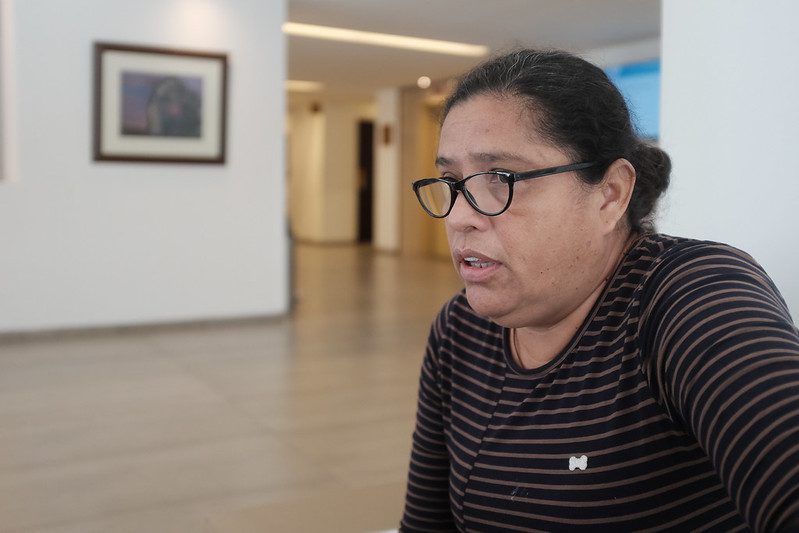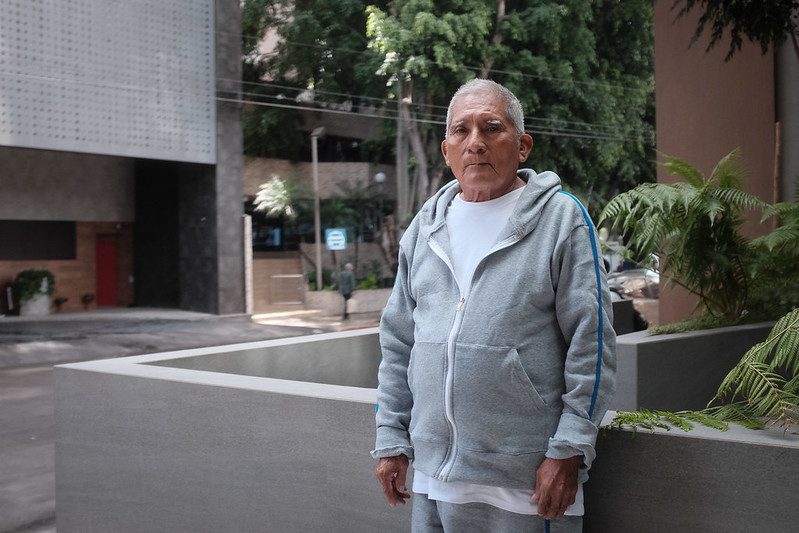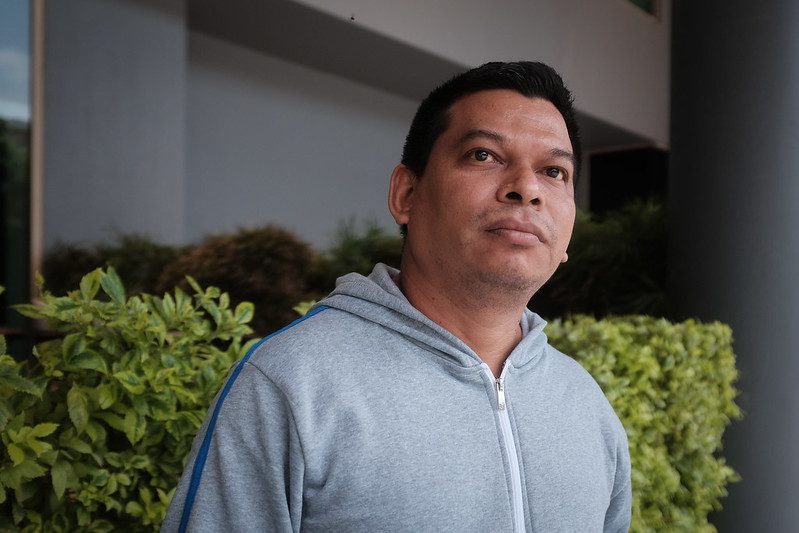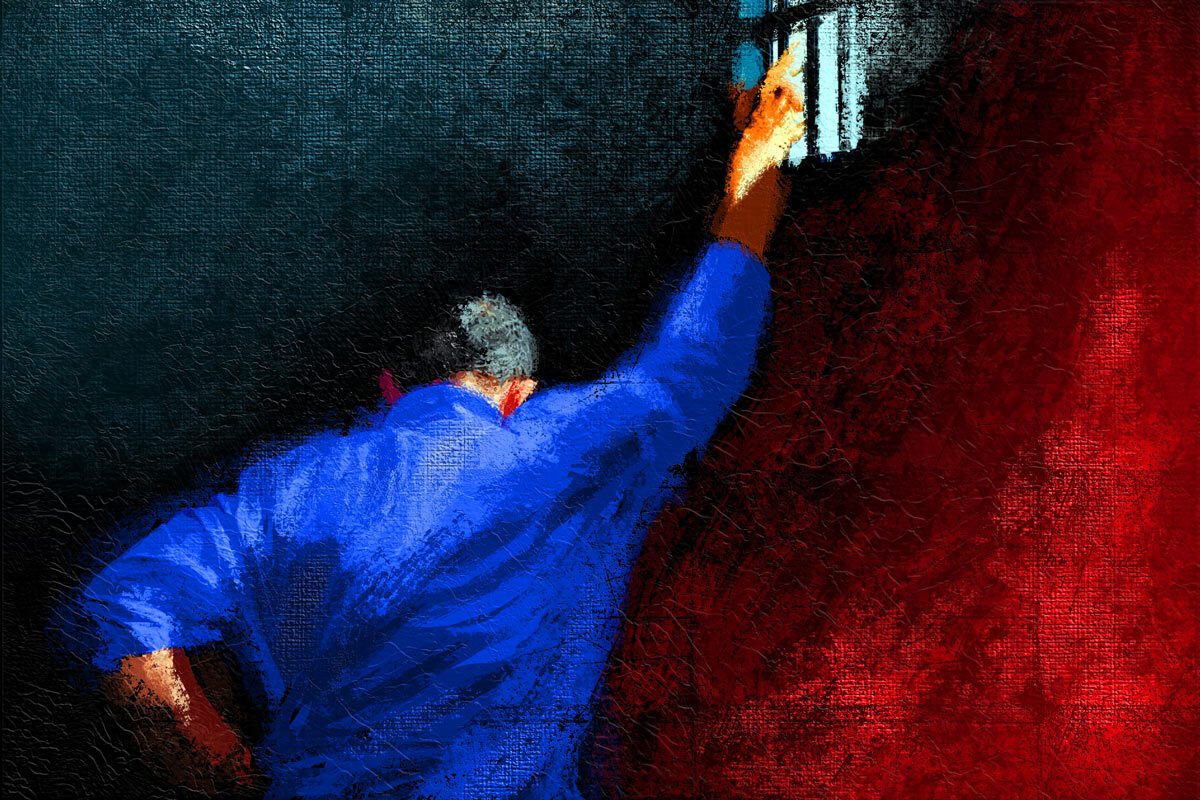When presidential candidates and members of political organizations were arrested in mid-2021, Olesia Muñoz thought, “There’s nothing we can do: all that’s left is to pray.”
Since then, 52-year-old Olesia says she distanced herself from political organizations. She had been a political prisoner for 319 days for participating in the protests that began in April 2018. But since 2021, she had avoided giving media interviews and refrained from criticizing the Ortega-Murillo regime on social media, having seen that “the slightest thing you said could get you arrested.” She didn’t leave the country because she didn’t consider herself a strong opponent. So, she thought that by staying quiet and keeping to herself, she could live a normal life.
She was wrong: on April 8, 2023, just before the fifth anniversary of the April Rebellion protests, police officers arrived at her home, requesting her presence for an “interview” at the Niquinohomo police station, where she is from.
There had been no prior harassment. They didn’t present an arrest warrant or any other documents. She didn’t resist. She got into the police vehicle and was taken straight from Niquinohomo to the District III police station in Managua, a place known for reports of cruel and inhumane treatment.
There, Olesia was confined for more than two months in a small, stiflingly hot cell, where she suffered multiple hypertensive crises.
“They were catastrophic months,” says Olesia, recalling how she was often woken up at any hour of the day for interrogations. She was not allowed family visits.
Since the police had no evidence that Olesia was an active dissident of the Ortega-Murillo regime, interrogators showed her photos from when she participated in the 2018 protests.
Olesia had been released from her first imprisonment due to an Amnesty Law passed by the Ortega-Murillo-controlled Parliament in June 2019. This law absolved all those accused of crimes during the crisis that began in April 2018.
Opponents criticized this law because its real aim was to absolve regime police and paramilitary forces involved in crimes against humanity during the repression.
Moreover, the law didn’t prevent released opponents from being re-arrested, as happened to Olesia Muñoz: despite distancing herself from political activism since 2021, she was arrested four years later for actions she committed in 2018.
17 months without conviction

In this second arrest, Olesia was accused of allegedly violating the Cybercrimes Law, with the “evidence” being comments—comments that Olesia denies making—on posts by Jorge Solórzano, Bishop of Granada.
“At the trial, they mixed everything up: photos of me from 2018, pictures of Monsignor Solórzano, and even photos of Pope Francis,” Olesia explains from a hotel in Guatemala, where she arrived after being banished on September 5th, along with 134 other political prisoners.
Olesia looks pale and a bit thinner. She speaks a lot about how God took care of her during her months in prison, trying not to directly criticize the regime leaders, even though she did so after her first release from prison.
After more than two months in District III, she was transferred to the Women’s Penitentiary in Tipitapa. For 17 months, she shared a cell with six other women. She lost hair, developed boils on her back due to the hot water used for bathing, ate from bags and with her hands, and her health issues worsened: hypertension and diabetic neuropathy.
But most significantly, she spent 17 months imprisoned without ever being convicted. “They never told me I was sentenced to anything,” Olesia states.This is why, whenever she could, she would tell the guards that she was being “shamelessly” held.
Although Olesia says her time in prison helped “strengthen” her faith in God, at times, when overwhelmed, she would shout, “I wish I’d never gotten involved in 2018!” At one point, María Verónica Herrera Galeano, another prisoner, responded by pointing out her own case: she had been imprisoned for being the secretary of the Caritas organization in Estelí. “I didn’t get involved in anything political; they just locked me up for having a job,” Herrera told her.
Absurd accusations and fabricated evidence
Testimonies collected by DIVERGENTES from exiles in Guatemala, and published by other media outlets and on social media, reveal multiple cases of individuals imprisoned who didn’t even consider themselves opponents of the Ortega-Murillo regime. Secretaries, lawyers, and employees of religious organizations (both evangelical and Catholic) were confined under deplorable conditions, with no family visits.
There are stories of people arrested for recording a man who was filming himself during a religious event banned by the regime. Others, like Olesia, were arrested for their political past, even though they had long since distanced themselves from parties and political organizations. Others were detained simply for being present and witnessing the arrest of a family member.
DIVERGENTES identified fabricated evidence used to justify convictions. Just as Olesia denies having commented on Monsignor Solórzano’s post, 76-year-old Juan Bautista García also refutes the accusation against him: that he called for the release of Rolando Álvarez, Bishop of the Diocese of Estelí. During the trial, it was alleged that García had 10,000 followers on his Facebook profile.
But the elderly man insists that he didn’t even own a cellphone, let alone know how to use social media. On the same day he was arrested, his son, Juan Isidro, was also taken. “I don’t even know Father (Rolando) Álvarez,” García says.
Widespread repression in Nicaragua

Human rights lawyer Uriel Pineda believes the imprisonment and subsequent banishment of these Nicaraguan citizens is part of the “widespread repression that exists in the country.”
Pineda explains that since 2021, the election year, repression has evolved. First, the Ortega-Murillo regime imprisoned the most visible opposition figures and activists. Then, the focus shifted to civil society, independent journalism, and opinion leaders. A third target was the Catholic Church.
“It’s a repressive policy aimed at silencing any critical voice, to the point where there were practically no more voices left to silence within the country,” the lawyer explains. He adds that this context “makes sense” of the arrests of people who were once active opponents or who worked in religious organizations.
The arrest of the Cyrenes of Nindirí
In Nindirí, a municipality in Masaya near the capital, the tradition of the Cyrenes was celebrated every year. It involved reenacting the biblical scene where Simon of Cyrene helps Jesus carry the cross to Calvary. At least a thousand people would dress in period costumes, and when the bells rang at noon, they would run through the streets carrying crosses or bundles of wood on their backs.
As part of the police state established in Nicaragua, the police banned the tradition in the town in April 2023. Some of the participants, outraged, said they would go ahead with it anyway because it was a religious and cultural tradition. So on Holy Monday, a group of them tried to participate, but the police chased them away. Later, it was revealed that one of the participants, Alberto Centeno, was arrested hours later.
José Ángel Cerrato, 38, was one of the Cyrenes of Nindirí. However, after the police ban, he decided not to take part. He went to watch to see if any of them would fulfill their promise despite the repression.
On Holy Tuesday, he went to the church and saw Marvin Gutiérrez Siezar recording himself dressed as a Cyrene in the church courtyard, explaining what the tradition was about. Cerrato thought it was a good idea to record him on his phone.
Gutiérrez was arrested minutes later by the police and couldn’t upload his video to social media. Cerrato, however, decided to upload the video to his Facebook profile, with the non-political caption, he claims: “Cyrene of Nindirí fulfills his promise in front of the church courtyard.”
The next day, on April 5, 2023, Cerrato was arrested while at work. “You’ll pay for that video,” a police officer told him when he was detained.
In total, five Cyrenes from Nindirí were arrested. They were all charged with Cybercrimes, Undermining National Integrity, Terrorism, and Conspiracy, and sentenced to eight years in prison and fined 300 days’ wages.
A regime’s message to “control and intimidate the general population”

“There’s a deterrent message to the general population: ‘These people, for practically doing nothing, were still caught by repression.’ It’s a warning to the general population to refrain from any kind of activism or involvement with any social or political actor opposed to the regime,” explains lawyer Uriel Pineda.
The specialist believes that all of this is part of the Sandinista Front’s strategy to maintain total and absolute control over society, for which they must “control, persuade, and intimidate the general population.”
The human rights expert says that this policy, aimed at silencing any critical voices in Nicaragua, has resulted in imprisonment, violations of due process, forced displacement of citizens, and other actions that constitute crimes against humanity.
The “other” political prisoners
DIVERGENTES spoke, under anonymity, with a former leader of a political party banned in the 2021 elections, who was arrested after completely distancing himself from the organization. “One day, the police came, and they threw me in jail,” he says.
In another hotel in Guatemala City, a woman walks alone, wearing the gray outfit that identifies her as one of the banished from Nicaragua. For now, she’s not giving interviews to the media, but she wants people to know about “the injustice done to the political prisoners.” She speaks in the third person, as if she weren’t one of them because before her arrest, she didn’t consider herself an opponent of the Ortega-Murillo regime.
She was an administrative worker for a religious organization. One day, the police came to her workplace and arrested her. She hasn’t seen her family since. With slightly trembling hands, she briefly talks about what happened to her, but she keeps returning to the stories of “the political prisoners,” the others, she says, whom she saw while she was in prison.





